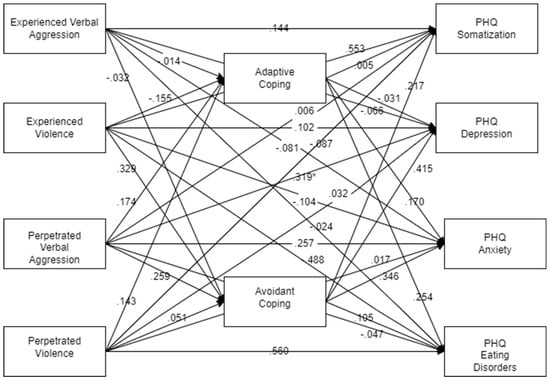Ijerph, Vol. 22, Pages 36: Experienced Versus Perpetrated Intimate Partner Violence And Psychological Maladjustment: The Role Of Adaptive And Avoidant Coping

IJERPH, Vol. 22, Pages 36: Experienced Versus Perpetrated Intimate Partner Violence and Psychological Maladjustment: The Role of Adaptive and Avoidant Coping
International Journal of Environmental Research and Public Health doi: 10.3390/ijerph22010036
Authors: Julie L. Nagoshi Craig Nagoshi Farzana Akter Vijayan K. Pillai
The present questionnaire study explores the relationship between intimate partner violence (IPV), coping strategies, and psychological maladjustment for both female and male college students, as well as considering the effects of perpetrated IPV. College students are at risk for experiencing and perpetrating IPV, and coping skills may act as important risk and protective factors. In total, 333 (247 women, 86 men) undergraduate college students completed an online survey for research participation credit. Perpetrated intimate partner verbal aggression and experienced and perpetrated relationship violence were significantly correlated with somatization and depression, while for women, perpetrated verbal aggression was significantly correlated with somatization, depression, anxiety, and eating disorder symptoms. Experienced verbal aggression was significantly correlated with depression for women, while perpetrated verbal aggression was significantly correlated with anxiety for men. Path analyses with bootstrapped mediation tests found that, for men, the relationships between experienced violence and somatization and depression were significantly mediated by avoidant coping, while for women, the relationships between perpetrated verbal aggression and somatization, depression, anxiety, and eating disorder symptoms were significantly mediated by avoidant coping. Findings suggest that, particularly for women, the use of avoidant coping behaviors may exacerbate cycles of victimization by and perpetration of IPV that, in turn, lead to greater psychological distress. The present findings suggest that interventions to reduce IPV should put greater emphasis on the teaching of adaptive coping skills in couple relationships to help reduce the impulse to perpetrate violence, on top of coping skills to deal with experienced violence.


